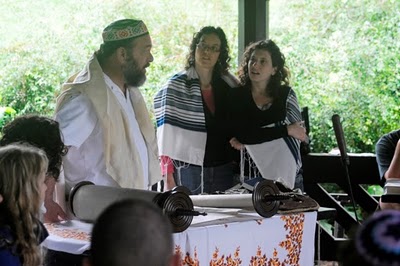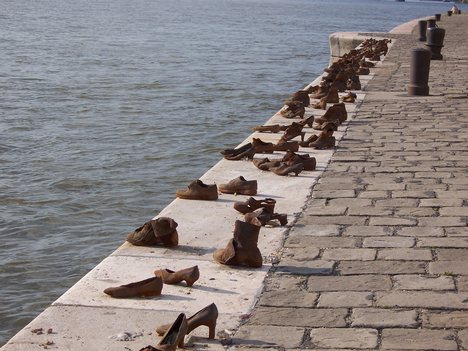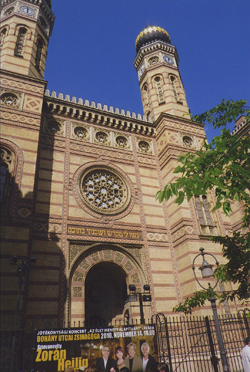Rebuilding the Jewish Community of Budapest
by Alan Rothenberg

Rabbi David Lazar at Bánkitó Torah reading. (Image courtesy of the Marom Europe blog)
Budapest, Hungary may seem like an unlikely place to fund Jewish leadership development, but in fact, it is exactly the type of program that highlights the Jewish Community Federation’s commitment to providing direct aid to some of the most vulnerable Jewish communities around the world. In partnership with the American Jewish Joint Distribution Committee (JDC), the Federation is investing in a major new leadership initiative this year in Budapest. By bringing together skilled individuals with different politics and agendas, we’re working to help create a deeper Jewish connection through participants’ engagement with one another and their Jewish community.

Before Kabbalath shabbath at the Budapest Moishe house. (Image courtesy of the Marom Europe blog)
BACKGROUND ON THE JEWISH COMMUNITY IN BUDAPEST Budapest is home to over 100,000 Jews, a recent census reveals, yet less than 2,000 are affiliated with the formal Jewish community, which is primarily Orthodox. A majority of the unaffiliated are under age 20, and are curious about their Jewish roots. The historical backdrop that kept Jews essentially unidentified and “underground” stems from 1940 -1990, when the Nazis, and then the Communists, purged the Jewish community of its leaders, its intellectuals, and anyone who stood in the way of the prevailing politics of the moment. Today, many parents and grandparents continue to tell their children never to “register” for anything Jewish, for fear that their recorded names will lead to unforeseen problems. Today, the vast majority of Budapest Jews are still in hiding from their cultural past.

Hungarian Jewish WWII Memorial
PROVIDING GATEWAYS TO JEWISH LIFE Despite Hungary’s political volatility, 45 small Jewish oriented social and cultural organizations have sprung up, reaching out to curious Jews in a way that does not require them to join in any traditional observance. These gateways to Jewish life range from summer camps to coffee shops, dance groups to music halls, Jewish schools to JCCs, all of whom operate independently, and without funding, from the ‘formal’ community. Few, if any of these developing Jewish groups appear to be working together. Federation’s Overseas Committee viewed this situation first-hand and identified it as an opportunity to create an alternative Jewish community, bringing interested attendees into organized, self-identified Jewish institutions and more importantly, instilling a confident and secure Jewish identity in modern Hungry.
FEDERATION'S COMMITTMENT TO CHANGE With the intention of assisting one of the largest Jewish communities in Europe to succeed and flourish for generations to come, Federation has committed the first installment of a three year funding investment. To ensure self-sustainability, the Budapest community will be increasing its financial contribution each year. This arrangement tackles a challenge in former Communist countries, where taking from the State was common, and a culture of giving and self-organizing was discouraged or prohibited.

A Budpest synagogue in the Jewish Quarter
The JDC, a Federation beneficiary, will oversee the community building projects in Budapest. These projects include leadership training initiative, as well as a mega-events component designed to draw in people of all ages and walks of life. If successful, this program may be a revolutionary prototype replicated anywhere in the world where Jews, emerging from repressive, anti-Semitic societies, are struggling to develop and maintain the continuity of their Jewish communities.

